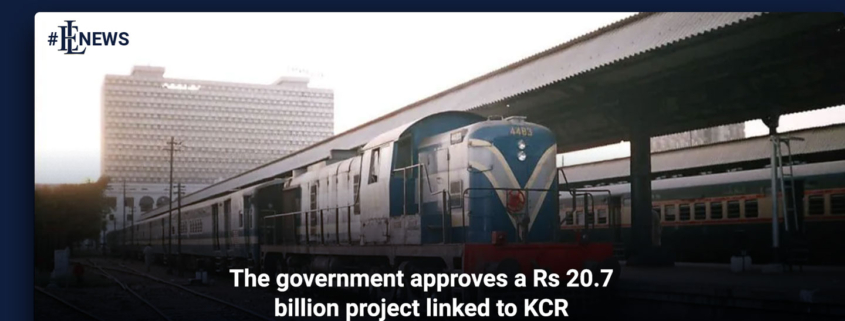The government approves a Rs20.7 billion project linked to KCR
The government approves a Rs20.7 billion project linked to KCR. The government approved a Rs20.7 billion project on Friday to ensure smooth traffic flow along the unfinished Karachi Circular Railway (KCR). This scheme is still in its infancy and will take time to complete.
The statement issued by the finance ministry, the Executive Committee of the National Economic Council (ECNEC) approved a summary presented by the Planning Commission for the construction of an infrastructure to eliminate level crossings on the KCR’s loop section.
Finance Minister Shaukat Tarin presided over the ECNEC meeting, which focused exclusively on constructing flyovers along the 29-kilometer KCR route.
At the scheduled meeting time, only two ECNEC cabinet members, including Tarin, were present.
The finance minister adjourned the meeting for a brief period before reconvening it. However, attendance remained low later on, and the Cabinet Division was required to obtain the consent of at least one minister before proceeding.
Read ECNEC approves Rs20.7 billion KCR infrastructure project: Umar.
According to sources, Tarin placed the blame for the low attendance squarely on the shoulders of the planning ministry. On the other hand, the planning secretary refused to accept responsibility, claiming that it was the Cabinet Division’s responsibility to complete the quorum.
It occurred despite Tarin’s earlier warnings to other ministers to attend meetings regularly and on time or risk having their memberships terminated.
The Supreme Court directed that the contract for the Rs20.7 billion project be awarded to the Frontier Works Organisation (FWO) without a competitive bidding process.
The railways’ ministry will sponsor and implement the project.
It calls for the construction of flyovers and underpasses along the KCR’s route, thereby preventing the need for 22 level crossings.
According to the finance ministry, the project’s rationalized cost is Rs20.7 billion on a cost-sharing basis.
Asad Umar, the Minister of Planning, announced that the KCR infrastructure project would be inaugurated next week with Prime Minister Imran Khan as the chief guest.
The previous PML-N government intended to build the KCR as part of the China-Pakistan Economic Corridor (CPEC), but the ruling PTI has decided to finance it privately.
Read more with EL news : The ADB expects a 4% growth in Pakistan in FY22
Prime Minister Imran Khan has included the project in the Rs736 billion Karachi package.
The government has decided to finance the Karachi package projects through three mechanisms: the Public Sector Development Programme (PSDP), Supreme Court funds, and public-private partnerships (PPPs).
The Rs300 billion KCR would be built largely with private sector assistance on a build-operate-transfer (BOT) basis, in addition to using Rs50 billion in funds deposited with the SC by a real estate developer.
During the CPEC’s tenth Joint Cooperation Committee meeting, Pakistan urged China to invite its companies to participate in the BOT bidding process for the project’s construction.
According to a planning ministry official, the Public-Private Partnership Authority conducts the project’s technical feasibility study.
In March 2020, the Supreme Court ordered the KCR’s revival and the construction of infrastructures such as underpasses and overhead bridges at level crossings to ensure that the project did not disrupt road traffic.
In August of last year, the SC directed that the project be assigned to the FWO and completed within six months of the start of construction work.
Continue reading Sindh government commits Rs6 billion to KCR financing.
The FWO submitted a Rs4.9 billion PC-I for the project’s first phase in May and a Rs11.5 billion PC-I for the project’s second phase in July.
According to the project documents, we will complete the scheme in three phases over 23 months.
The Sindh government would make an upfront payment of Rs6 billion following the apex court’s instructions.
The Sindh chief minister had directed that the project’s fencing wall be constructed by Pakistan Railways for Rs1.3 billion.
The ECNEC also approved a recommendation by the Planning Commission that the Central Development Working Party (CDWP) be authorized to consider projects that the executive committee had agreed with the goal of cost rationalization.
If the rationalization exercise results in a cost reduction, the CDWP will approve such projects. They submit the status report to the ECNEC chairman for review.
If the project’s cost is revised upward, it will be resubmitted for approval to ECNEC. The CDWP is authorized to approve projects up to a value of Rs10 billion.
Keep up with Estate Land Marketing for news and updates.





Leave a Reply
Want to join the discussion?Feel free to contribute!